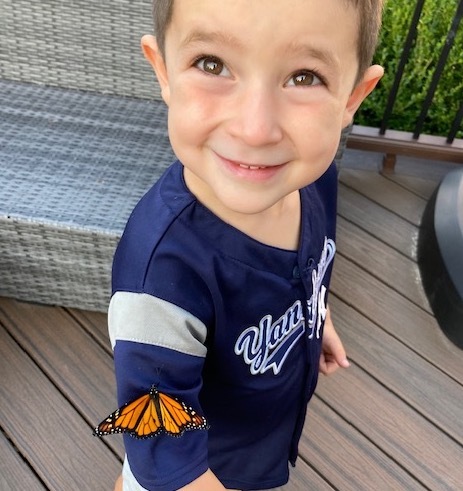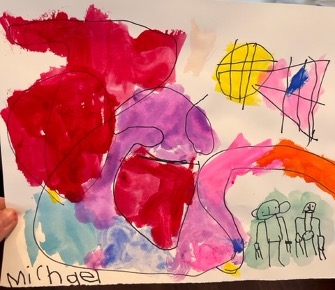7 Meaningful Strategies for Supporting a Positive Transition to Kindergarten


Confident, Cared for, Capable Children
“Mom, what will happen when I go to kindergarten? Will I have to sleep there?” my wide-eyed, newly five-year-old son asks while we drive to pre-k.
I glance back at him in the rearview mirror, and my desires for his kindergarten year flood my mind. I can’t believe my baby’s time to begin kindergarten has come. As a former kindergarten and preschool teacher as well as an NJDOE kindergarten liaison, I have always felt deeply connected to children’s transition to kindergarten—now, as a mom, more than ever.
When I speak with fellow early childhood educators, I often invite them to consider a child they know and love who is entering kindergarten and ask themselves, “What do you want for that child in their kindergarten year?” Common answers include feeling loved, friendship, creativity, laughter, joy, persistence, collaboration, independence, problem solving, a sense of belonging, and a love of learning. Now, when I think of my own child, these are the very same things I wish for him as he embarks on his school journey.
Reflecting on past conversations with teachers, as well as my hopes for my own child, has led me to consider how teachers and families can work alongside each other to support children as they transition to kindergarten and ensure they are provided with every opportunity to absorb the rich experiences that lie ahead. Fortunately, many of the most important skills and learning experiences that will help prepare children for kindergarten can be nurtured through seven fundamental, developmentally appropriate strategies.
1. Establish routines.
When children know when they can expect things to happen, it leads to feelings of security, independence, and safety. Developing a structure for events that occur each day, such as morning, evening, and mealtime routines, supports children in understanding the predictable nature of these routines and helps children develop a sense of what is expected of them. Talk with children about the sequence of events and involve them in the process of developing routines.
2. Foster independence.

Supporting children in meeting their own needs helps them learn to take responsibility for their own well-being. By offering children opportunities to practice skills such as peeling their own orange, setting up an activity of their choosing, and zippering their own jacket, you foster children’s sense of independence. Try offering specific feedback, such as “I see you chose your collage box and glue. You concentrated hard as you secured your collage pieces to the paper.”
3. Model positive social and emotional skills.
Narrating a social conflict aloud and letting children know you are there to help can support children in their understanding of the situation at hand. By consistently modeling and practicing a variety of solutions to common social problems for children, such as trading toys, adults ensure that children have the knowledge and tools necessary to respond to social situations in positive ways. How we conduct ourselves in our day-to-day interactions leaves a lasting impression on how children internalize pro-social behaviors. Talking aloud as you compromise or take turns with other adults is one way to model healthy habits throughout the day.
4. Notice the world around you.
 While spending time outdoors and in your community take notice of life happening around you. Invite children to describe what they see, hear, smell, and feel. What shapes do you notice on the sides of buildings? How do the leaves on the trees look? What textures do you feel at the grocery store? What sounds do you hear on the way to school? Talk with children about their observations and find opportunities to introduce new words. Involving children in real-world tasks, such as creating a shopping list, organizing the laundry, or collecting the change and receipt at the pharmacy, provides children with meaningful opportunities to use literacy and math skills. You might also consider inviting children to record what they noticed in a drawing.
While spending time outdoors and in your community take notice of life happening around you. Invite children to describe what they see, hear, smell, and feel. What shapes do you notice on the sides of buildings? How do the leaves on the trees look? What textures do you feel at the grocery store? What sounds do you hear on the way to school? Talk with children about their observations and find opportunities to introduce new words. Involving children in real-world tasks, such as creating a shopping list, organizing the laundry, or collecting the change and receipt at the pharmacy, provides children with meaningful opportunities to use literacy and math skills. You might also consider inviting children to record what they noticed in a drawing.
5. Read, read, read, and read some more!
One of the most important things we can do to support reading and writing skills is to read aloud with children. Strive to read aloud at least once each day and use reading time as an opportunity to connect with children and hold meaningful conversations about what you are reading. There are limitless ways you can enhance your reading time with children.
-
- Consider visiting your local library to try a variety of literature, including poems, stories, and alphabet and number books, as well as nonfiction texts.
- Explore the sounds of language as you read by finding rhyming words or words that begin with the same sound.
- Explain how print works by pointing to words as you read them.
- Invite children to make personal connections to the story characters, e.g., “Can you think of a time when you felt lonely?”
6. Embrace mistakes.
Reminding children that mistakes are a normal part of life and a way to learn enables children to develop the sense of security needed to experiment, try new ideas, fail, and persist. Encourage children to try new things without fear of “getting it right” or being perfect. Notice when children are making progress and encourage them to reflect on their efforts by asking questions, e.g., “What could you do differently next time?”
7. Value play.
Children learn a great deal about themselves and the world through play. Providing ample time for daily unstructured and uninterrupted play, especially outdoors, promotes development in each of the domains of development and learning, including social-emotional, language, physical, cognitive, literacy, and mathematics
Experience Life Alongside Children

You may have noticed that memorizing the entire alphabet, using flashcards, and practicing rote counting to 100 are not included in any of the suggestions. Here at Teaching Strategies, we believe in supporting the development of the whole child while nourishing warm and caring relationships. Intentionally introducing and calling attention to literacy and math skills in authentic, meaningful, and engaging ways is crucial to ensuring children form strong connections to the skills they are learning and developing.
Young children flourish when the adults in their lives offer rich and guiding language while experiencing life alongside children. When you notice pre-k children becoming interested in something, having a disagreement with a friend at the park, struggling to zip a new coat, or giving up when their block tower falls, show children you care about their ideas, relationships, efforts, and thoughts by offering them the gift of your attention and conversation. These invested moments teach children to view themselves as capable and contributing members of the community while also nurturing their patience, resilience, and curiosity—all skills that support a smooth and healthy transition to the wonder-filled year that lies ahead. Even if the mom in me isn’t quite ready for how quickly her baby is growing up, the time I spend learning with him will help him be ready for friendship, independence, joy, and all those other beautiful things we wish for our children in kindergarten.